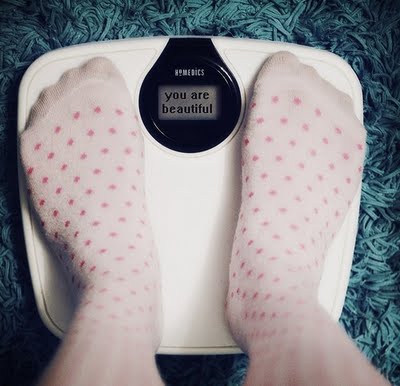You may have one in your bathroom or you may keep it hidden under your bed. Some of you may climb onto your scale without much thought, while others think of nothing else. I can think of few things capable of causing both anxiety and excitement quite like the scale. I’ve seen individuals with perfectly healthy relationships with their scale and others develop love/hate relationships with theirs. So how do you know if it’s time to call it quits?
On one hand, self-weighing has been shown to be an effective weight-loss aid and is also useful for weight maintenance and for preventing weight gain. For some individuals, stepping on the scale serves to quantify progress, keeping them motivated, focused and also allowing them to quickly get back on track if they have a slip-up. These individuals are encouraged by the number they see on the scale, but aren’t fixated on it. And if the reading isn’t what they expected it to be, they take it in stride and focus on bettering their eating/exercise patterns, not on the number.
On the other hand, frequent weigh-ins are cause for concern for some individuals, who view the scale as nothing but a source of anxiety and frustration, which can take a serious toll on self-image. There are also those who are solely motivated by the number on the scale, losing sight of the bigger picture and of the benefits that come with a healthier lifestyle. And then, there are those who use food in a celebratory way after a successful weigh-in, or as comfort after a disappointing weigh-in. In these cases, a break up with the scale is advisable. Instead, progress should be measured using more intuitive approaches that focus on how you feel or how your clothes fit, for example.
How to weigh yourself correctly
If weigh-ins are in fact a part of your routine, it’s crucial to get the measurement right. Here’s how to do it:
Your scale should be placed on a hard, level surface. You want to weigh yourself on the same day of the week, first thing in the morning after a trip to the bathroom, in the buff or always wearing the same amount of clothing. And since not all scales are calibrated equally, you want to weigh yourself on the same scale, which means no weighing yourself at the gym one week and then at home the next. As for frequency, I generally cap weigh-ins at once per week. I consider daily home weigh-ins excessive, since they fail to take into account normal day-to-day weight fluctuations caused by:
Fluids: Although it may seem counterintuitive, your body holds on to fluids when you aren’t properly hydrated.
Sodium: The same is true for high-sodium diets, which also promote water-retention.
Glycogen: Carbohydrates stored in your muscle and liver as glycogen are stored with water. If your glycogen stores are depleted (say after week of a low-carb diet) you can expect to gain water weight on the scale.
Menstrual cycle: Some women experience a steady increase in weight due to water retention during their prementrual cycle, reaching it’s highest point during the first half of menstruation.
Constipation: The weight of the, ahem, “waste” along with any associated bloating can add pounds to the scale.
Changes in body composition: The scale measures your weight but gives you no detail on your body composition. In some instances, a loss in fat may be camouflaged by an increase in lean muscle mass. Circumference measurements, skinfold measurements or simply paying attention to the looseness of your clothes can be an indicator of changes in body composition.
So, should you break up with your scale? I guess that depends. I have some clients who are eager for their weigh-ins and for whom it is a useful tool and others who choose to avoid the scale altogether. Either way, one thing is clear: you must find barometers of success that go beyond the scale. Think about it; a low number on the scale is nothing to brag about if it’s at the expense of lost muscle mass after a week of very low-calorie dieting. Or what if the scale doesn’t budge for a few weeks, but your workouts are progressing and your energy levels are through the roof…wouldn’t you agree that this is a good thing? Find your motivation in your healthy living. Because there are many things your scale doesn’t weigh:
- Your worth
- The healthfulness of your diet
- The progress you’re making at the gym
- The progress you’re making as a homecook
How is your relationship with your scale? Is it healthy/strong or love/hate? How do you measure your progress towards your goals?
Photo: Pinterest





Leave a comment